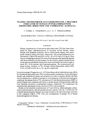 42 citations,
January 2006 in “Obstetrical & Gynecological Survey”
42 citations,
January 2006 in “Obstetrical & Gynecological Survey” The document concludes that correct diagnosis and management of PCOS are important, and more research is needed on its risks and treatments.

Individualized treatment plans, including lifestyle changes and specific medications, are crucial for managing PCOS in adolescents.
 29 citations,
February 2018 in “Genetics research international”
29 citations,
February 2018 in “Genetics research international” Certain genetic variations are linked to increased androgen levels in PCOS, but more research is needed to understand these connections fully.
 1 citations,
August 2023 in “Curēus”
1 citations,
August 2023 in “Curēus” Metformin helps reduce PCOS-related infertility by improving insulin sensitivity and inducing ovulation.
 March 2024 in “International journal of life-sciences scientific research/SSR Institute of International Journal of Life Sciences”
March 2024 in “International journal of life-sciences scientific research/SSR Institute of International Journal of Life Sciences” PCOS has many symptoms, with high androgen levels being the most common.
 10 citations,
January 2019 in “The Nurse Practitioner”
10 citations,
January 2019 in “The Nurse Practitioner” PCOS is a common hormonal disorder in women, treated with lifestyle changes, medication, and patient education.
 February 2024 in “Journal of ayurveda and integrated medical sciences”
February 2024 in “Journal of ayurveda and integrated medical sciences” Ayurvedic herbs can help manage Polycystic Ovarian Syndrome (PCOS).
 January 2022 in “Journal of current research in food science”
January 2022 in “Journal of current research in food science” Eating healthy and exercising can help manage Polycystic Ovarian Syndrome and its related health problems.
 1 citations,
February 2018 in “InTech eBooks”
1 citations,
February 2018 in “InTech eBooks” PCOS in lean women is a serious health condition with implications beyond fertility, affecting metabolism and increasing cardiovascular disease risk.

There are many ways to treat Polycystic Ovary Syndrome, including lifestyle changes, surgery, and various medications, but more research is needed for better treatments.
 8 citations,
January 1989 in “Journal of Dermatological Treatment”
8 citations,
January 1989 in “Journal of Dermatological Treatment” This text talks about how to treat hair loss in women. It suggests different options and stresses the importance of support.
 4 citations,
April 2017 in “International journal of reproduction, contraception, obstetrics and gynecology”
4 citations,
April 2017 in “International journal of reproduction, contraception, obstetrics and gynecology” The study concluded that a higher waist-hip ratio significantly increases the risk of metabolic syndrome in women with PCOS.
 62 citations,
July 2017 in “Endocrine connections”
62 citations,
July 2017 in “Endocrine connections” Adults with polycystic ovary syndrome are much more likely to have obstructive sleep apnea.
 6 citations,
November 1980 in “Clinical Endocrinology”
6 citations,
November 1980 in “Clinical Endocrinology” Measuring plasma testosterone glucosiduronate is a reliable way to detect high male hormone levels in women.
 December 2024 in “African Journal of Biomedical Research”
December 2024 in “African Journal of Biomedical Research” Combining lifestyle changes and medication is most effective for managing PCOS symptoms.
 17 citations,
June 2010 in “Journal of Cosmetic Dermatology”
17 citations,
June 2010 in “Journal of Cosmetic Dermatology” Many women with hard-to-treat acne also have PCOS.

PCOS requires personalized treatment to improve life quality and reduce health risks.
 3 citations,
January 2013 in “Egyptian Liver Journal”
3 citations,
January 2013 in “Egyptian Liver Journal” Many young Egyptian women with PCOS also have fatty liver disease, especially if they are overweight and insulin resistant.
 3 citations,
January 2023 in “International Journal of Molecular Sciences”
3 citations,
January 2023 in “International Journal of Molecular Sciences” Heat Shock Proteins are important in the development of Polycystic Ovarian Syndrome and could be targets for new treatments.
 November 2023 in “Curēus”
November 2023 in “Curēus” Melatonin may help manage PCOS by improving insulin sensitivity, hormone balance, and mood.
 January 2024 in “International journal of yogic, human movement and sports sciences”
January 2024 in “International journal of yogic, human movement and sports sciences” Yoga Nidra improves well-being and reduces anxiety in women with PCOS.
 August 2023 in “Medicina-lithuania”
August 2023 in “Medicina-lithuania” Abusing steroids can damage your heart, muscles, reproductive system, liver, skin, and brain, and may increase the risk of Alzheimer's disease.
 23 citations,
January 2016 in “Journal of Nanjing Medical University”
23 citations,
January 2016 in “Journal of Nanjing Medical University” Overweight women with PCOS are more likely to have excess male hormones.
 9 citations,
March 2022 in “Frontiers in Endocrinology”
9 citations,
March 2022 in “Frontiers in Endocrinology” About 19.4% of Iranian women in the study have Polycystic Ovary Syndrome, with the most common type involving irregular periods and high male hormone levels, but their heart and metabolic health is similar to women without the condition.
 271 citations,
December 2005 in “New England journal of medicine/The New England journal of medicine”
271 citations,
December 2005 in “New England journal of medicine/The New England journal of medicine” The document likely offers guidance on treating a woman's excessive hair growth, considering her symptoms and obesity.
 28 citations,
November 2014 in “Current Diabetes Reports”
28 citations,
November 2014 in “Current Diabetes Reports” Girls with PCOS during adolescence have a higher risk of developing type 2 diabetes, and early treatment can help manage this risk.
 58 citations,
November 2020 in “International Journal of Molecular Sciences”
58 citations,
November 2020 in “International Journal of Molecular Sciences” SHBG may be a useful early indicator and treatment target for PCOS.
 3 citations,
August 2020 in “Nutrition Journal”
3 citations,
August 2020 in “Nutrition Journal” Spinach-derived thylakoid supplements plus a low-calorie diet helped obese women with polycystic ovary syndrome lose weight and improve their metabolism.
 January 2019 in “ISGE series”
January 2019 in “ISGE series” The document concludes that effectively managing PCOS requires a multifaceted approach.
 July 2023 in “International Ayurvedic medical journal”
July 2023 in “International Ayurvedic medical journal” Ayurvedic treatment can effectively manage PCOS and its symptoms.






























